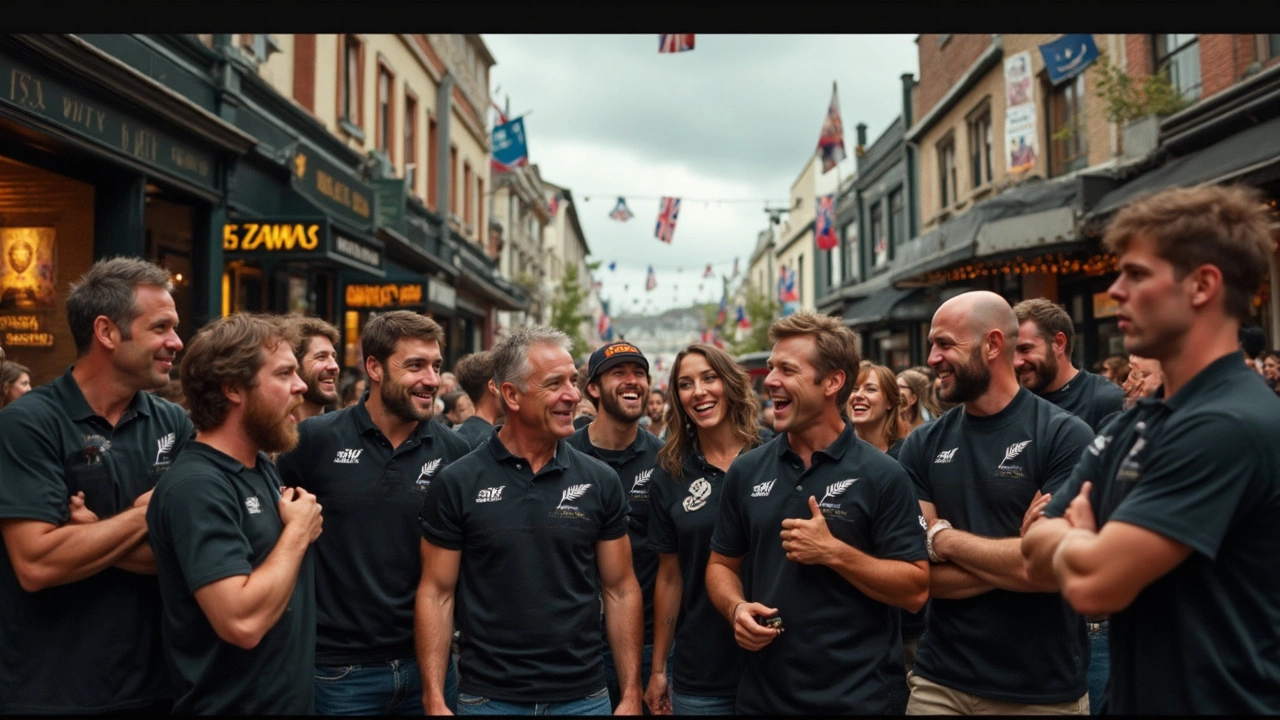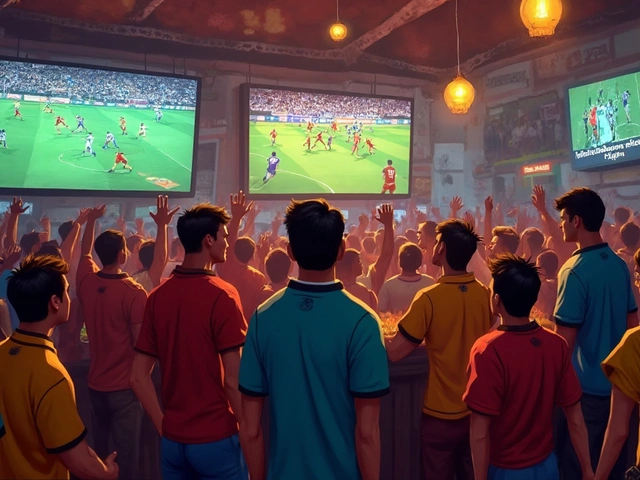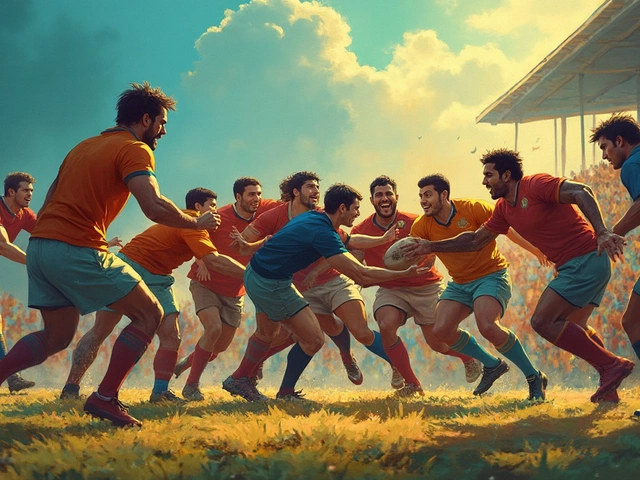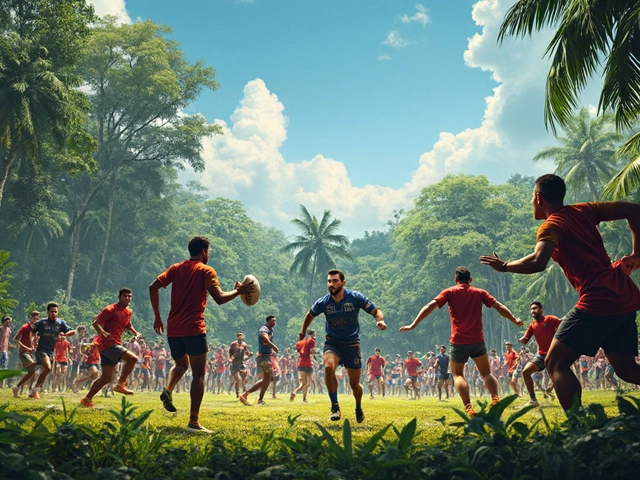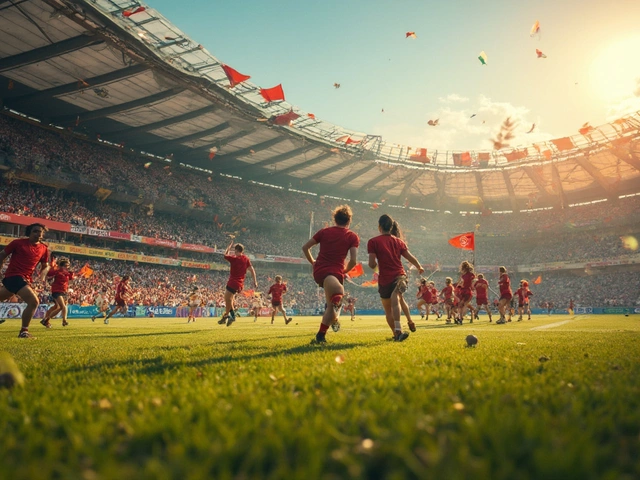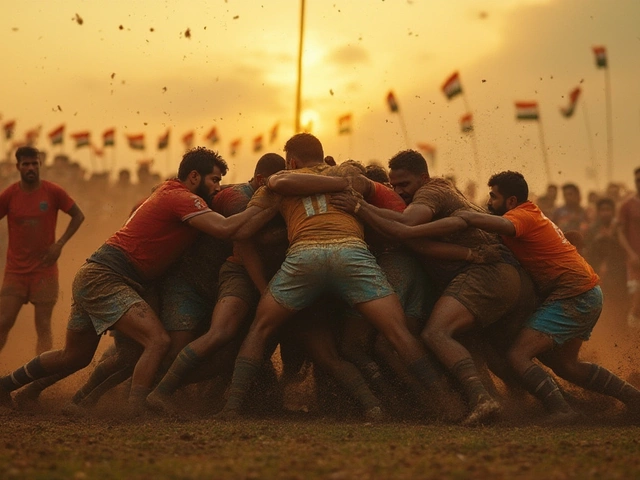Ask a New Zealander about rugby, and you might hear words that sound more like family talk than sports chat. This isn’t just a game here—it’s stitched into every part of life, from backyard matches to packed stadiums. If you show up in Auckland or Wellington and say ‘rugby union’ or ‘rugby football,’ you’ll get a polite smile, but most folks just call it ‘rugby’—plain and simple.
But the real giveaway that you’re talking to a local? You’ll hear ‘footy’ tossed around almost as often. Unlike in places like Australia, where ‘footy’ can mean Aussie Rules or league, in New Zealand it practically always points to rugby. So if someone invites you to the ‘footy on Saturday,’ they mean an All Blacks match or a local club game, never soccer or AFL.
- Why Rugby Matters in New Zealand
- The Local Lingo: What Do They Really Call It?
- All Blacks: More Than a Team Name
- Rugby Fixtures: How Kiwis Follow the Game
- A Few Surprising Facts Every Fan Should Know
- Tips for Talking About Rugby Like a Local
Why Rugby Matters in New Zealand
If you want to understand New Zealand, don’t look at government or business—just look at rugby. The sport is everywhere. Since the first official game in 1870, it’s grown into something way bigger than a weekend hobby. Most kids pick up a ball as soon as they’re steady on their feet, and local clubs are packed from early winter until late spring. School teams fight hard over bragging rights, and even tiny towns turn out big crowds.
What really sets things apart is how rugby brings everyone together. When the All Blacks play, the whole country seems to pause. You’ll see black jerseys at airports, barbecue grills fired up, and people glued to screens in living rooms, bars, and even gas stations. Rugby isn’t just a sport—it's social glue here.
Here’s the thing: for a country with under five million people, New Zealand punches way above its weight. The All Blacks hold a record three Rugby World Cup wins (1987, 2011, and 2015). That’s a source of proud national identity. People swap stories of famous matches and legendary tries like they just happened last week. Teams like the Crusaders or Hurricanes pack out stadiums every Super Rugby season, showing the grassroots game feeds right into the top tier.
- In 2024, there were over 150,000 registered rugby players in New Zealand, according to New Zealand Rugby Union stats.
- Women’s rugby is growing too—after the Black Ferns won the 2022 Women’s Rugby World Cup, girls’ sign-ups jumped across the country.
- Rugby’s influence even reaches politics and business, with former players taking leadership roles everywhere from local councils to parliament.
So if someone tries to name the most important thing in New Zealand weekend plans, they’ll probably just say one word: rugby.
The Local Lingo: What Do They Really Call It?
If you want to sound like a Kiwi, just call it rugby. That’s it. You won’t catch many New Zealanders saying “rugby union” unless they’re talking to someone overseas who might get confused with rugby league. Locally, rugby league goes by just “league.”
‘Footy’ is super common too, but here’s the twist—in New Zealand, ‘footy’ almost always means rugby, especially in the North Island. Soccer, which is called ‘football’ in many countries, gets called ‘soccer’ here to keep things simple.
Here’s how it usually breaks down in everyday chat:
- “Rugby” refers to rugby union.
- “League” means rugby league.
- “Footy” is almost always rugby union, unless folks clarify otherwise.
- “Soccer” is what people call association football.
It’s worth noting how language changes by region, but these rules are solid across most of the country. Don’t be surprised if you hear kids in the playground shouting about ‘touch’—that’s their casual version of rugby, played without tackles.
Check out this short table showing what each term means in Kiwi English:
| Term | What It Means in NZ |
|---|---|
| Rugby | Rugby Union |
| Footy | Usually Rugby Union |
| League | Rugby League |
| Soccer | Association Football |
| Touch | Tag/Touch Version of Rugby |
Stick to these terms, and you’ll fit right in when chatting about rugby in New Zealand. If you use ‘football’ for soccer, you might get odd looks. No one here wants to miss an All Blacks game because they misunderstood the invite!
All Blacks: More Than a Team Name
In New Zealand, the words “All Blacks” carry serious weight. It’s not just the nickname for the country’s top rugby team—it’s a symbol. The All Blacks represent rugby’s highest standard, and almost every Kiwi knows the team’s history better than they know their own family tree. Since their first official tour in 1905, the All Blacks have set the pace for international rugby, crushing records and winning respect worldwide.
You’ll hear the All Blacks mentioned way more often than “New Zealand national rugby union team.” Most fans—young or old—just say “the ABs” or simply “the Blacks.” The black jersey with the silver fern is about as close as it gets to a national uniform, and fans everywhere throw on their own black shirts when there’s a big match on.
The tradition starts young: New Zealand kids dream of running out with the team, and schools line up to watch big games, especially when the annual Bledisloe Cup matches roll around. The pre-game haka (a Māori challenge) isn’t just for show—it sets the tone, intimidating opponents and firing up players and fans alike.
There’s concrete proof the All Blacks aren’t just hype. Here’s a look at their record since rugby went professional in 1995:
| Years | Win Rate (%) | World Cup Titles | Notable Streaks |
|---|---|---|---|
| 1995-2024 | Almost 77% | 3 (1987, 2011, 2015) | 18 wins straight (2013-2014) |
The All Blacks aren’t all about stats, though. Players like Richie McCaw and Dan Carter are household names, often spoken about like movie stars. When there’s a rugby fixture with Australia, England, or South Africa, you can pretty much guarantee the whole country will be glued to the TV or at the pub, cheering on the team. If you want to start a real conversation with a New Zealander, ask them their favourite All Blacks moment—you’ll get stories for days.

Rugby Fixtures: How Kiwis Follow the Game
Rugby isn’t just a sport schedule in New Zealand—it’s a full-blown ritual. Most Kiwis know the big rugby fixtures by heart, whether it’s the Super Rugby season, the Bledisloe Cup, or a grassroots club match at the local park.
When the All Blacks play, it’s almost like the whole country presses pause. People gather around TVs in living rooms, at pubs, or wherever they can get a screen and a few mates together. Even local newspapers and radio stations put out fixture lists, so nobody misses a big game. For family weekends, it’s not even unusual to plan barbecues and gatherings around kickoff time.
Here’s a look at how tightly rugby fixtures run in a typical Kiwi year:
| Competition | Typical Season | Kiwi Teams Involved |
|---|---|---|
| Super Rugby Pacific | Feb to June | Blues, Chiefs, Hurricanes, Crusaders, Highlanders |
| Bunnings NPC | August to October | 14 regional teams |
| Bledisloe Cup | Usually August–October | All Blacks vs Australia |
| All Blacks End-of-Year Tour | November | All Blacks vs Europe/South Africa |
A lot of locals still swear by catching Saturday afternoon club rugby. Yes, Super Rugby and international games pull huge TV crowds, but there’s something about standing on the sideline, chewing the fat, and watching two local teams duke it out live. These club fixtures are where future All Blacks grow up—Kiwis keep a close eye on rising stars here.
If you want to keep up like a local, there are a few good options:
- Check NZRugby.co.nz—that’s your main calendar for fixtures, results, and updates.
- Download the New Zealand Rugby app; it gives live score updates and match alerts.
- Follow local clubs and teams on social media—many often livestream games now.
- Local radio still broadcasts match commentaries if you’re away from screens.
Bottom line: knowing the fixtures isn’t just useful for diehard fans, it’s pretty much social glue in New Zealand. If you want to fit in, get the main match times in your diary, and you’ll never miss out on the next big moment.
A Few Surprising Facts Every Fan Should Know
Let’s clear up some things that baffle even seasoned rugby fans. For starters, New Zealand has more rugby clubs per person than almost anywhere – that’s not just a quirky stat; it means you’ll find a pitch in pretty much every town and suburb. It’s tough to grow up here without at least trying rugby once.
If you think the All Blacks name is just random, think again. It comes from their all-black kit, but the nickname has been around since 1905! Now, ‘All Blacks’ is one of the world’s most recognized team monikers—up there with the Yankees or Lakers. And those constant haka performances before matches? That’s not just a show. Kiwis take it seriously as a sign of pride and respect, not just for their team, but for Māori history too.
Here are a few more eye-openers for rugby fans:
- Rugby was first played in New Zealand in the 1870s, and it quickly overtook cricket as the top national pastime.
- New Zealand’s women’s rugby team—the Black Ferns—are every bit as successful as the All Blacks but often get overshadowed. They’ve dominated global championships for years.
- Tickets to top fixtures like the Bledisloe Cup matches usually sell out quick, but you’ll find Kiwis just as loyal cheering local provincial games in the rain.
- You’ll hear die-hard fans say, “rugby is religion here,” and they’re not joking. Even the country’s prime ministers have been known to make cameo appearances at major matches.
If you're after true bragging rights, know this: New Zealand has held the Rugby World Cup trophy three times, and the 2015 final saw over half the country watching on TV. Safe to say, rugby isn’t just a game in New Zealand—it’s a way of life.
Tips for Talking About Rugby Like a Local
If you want to sound like you’re from New Zealand, just saying ‘rugby’ isn’t always enough. The way you talk, the words you choose, and even how you chat about the New Zealand national team can make or break your street cred.
- Call the team ‘the All Blacks.’ Almost no one calls them ‘New Zealand Rugby Team.’ It’s just ‘the All Blacks’ or sometimes ‘the boys’—you’ll hear both from real fans.
- Never refer to the game as ‘rugby union’ unless you’re trying to separate it from rugby league—otherwise, it just sounds odd in everyday Kiwi talk.
- If you hear ‘Super Rugby,’ that’s the main pro club competition, not a made-up name. For local rivalry, ‘mitre 10 Cup’ or now ‘Bunnings NPC’ is the domestic competition everyone’s into during the winter months.
- 'Test match' means an international fixture, usually big All Blacks games, while a ‘local game’ often means anything from school matches to provincial derbies.
- Don’t try hard to impress with rugby jargon unless you actually know what it means. Words like ‘breakdown,’ ‘ruck,’ and ‘scrum’ carry weight, and Kiwis spot fakes a mile away.
- If you’re ever stuck, ask questions like ‘Who’s your favourite player?’ or ‘Got plans for the footy this weekend?’—these open up conversation and show you’re genuinely interested.
And here’s a simple one: never ask, ‘Who are the All Blacks?’ if you’re hoping for a warm welcome. It’s like asking who the Beatles are in Liverpool. Knowing these basics will have you blending in like you’ve watched games at Eden Park all your life.
